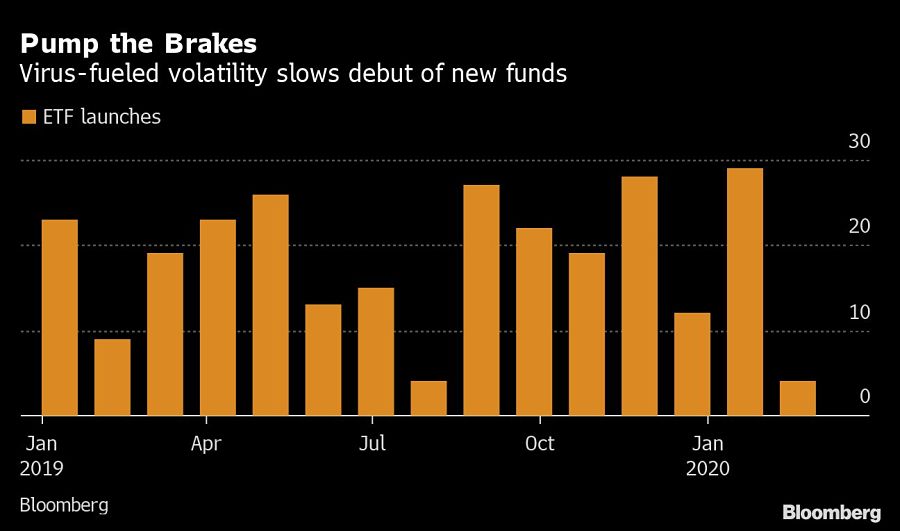

The dramatic volatility in global markets made issuers in the almost $4 trillion exchange-traded fund industry slam the brakes this month.
As the coronavirus pandemic roiled the world, only four new ETFs started trading in March -- the slowest pace since August, according to data compiled by Bloomberg. That’s a steep drop from the 29 funds that were launched in February, the best month since November 2017.
The reason behind the decline is simple: Companies are refraining from ETF debuts amid market turbulence. In addition, it’s harder for salespeople to market their new products when self-isolation measures are making it impossible to hold face-to-face meetings, according to UBS Global Wealth Management’s David Perlman.
“Given the market volatility and just the environment we’re in, it’d be pretty hard to raise assets,” Perlman said. “Advisers and analysts have more pressing issues than reviewing a brand new strategy right now.”

Innovator has been one of the few issuers to brave the waters in March, with a trio of U.S. stock “buffer” ETFs that seek to shield investors from a certain percentage of losses. The Esoterica NextG Economy ETF (WUGI) launched Tuesday.
Amid all the uncertainties, it may be hard to predict the trend of ETF debuts next month. But one issuer, American Century, said Tuesday that the American Century Focused Dynamic Growth ETF and the American Century Focused Large Cap Value ETF -- the first active nontransparent ETFs -- will begin trading Thursday.
The fact that the company delayed the launch of these new types of funds was likely to their benefit, according to Bloomberg Intelligence’s Athanasios Psarofagis. American Century said in May that it would license Precidian’s intellectual property for active nontransparent ETFs, after regulators cleared a pathway for the products in the previous month. The plan to launch Thursday likely shows they think markets will stabilize from here, Psarofagis said.
“They are making a market call and hoping to catch an updraft,” said Psarofagis, an ETF analyst. “Since these are active, their performance track record is going to be key.”

New survey reveals heightened investor concern over market volatility, retirement readiness, and the impact of tariffs on living costs.

Stifel – so far - is on the hook for more than $166 million in damages, legal fees and settlements in investor complaints involving Roberts, a 35-year industry veteran.

Consolidation continues in US wealth management industry.

Tech company democratizes access to US trading infrastructure.

RBC Wealth Management's latest move in New York adds an elite eight-member team to its recently opened Westchester office.
Orion's Tom Wilson on delivering coordinated, high-touch service in a world where returns alone no longer set you apart.
Barely a decade old, registered index-linked annuities have quickly surged in popularity, thanks to their unique blend of protection and growth potential—an appealing option for investors looking to chart a steadier course through today's choppy market waters, says Myles Lambert, Brighthouse Financial.
